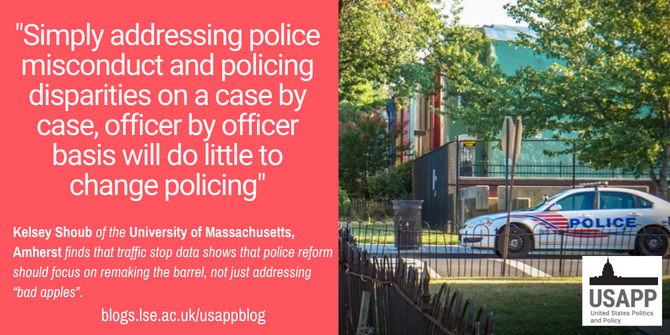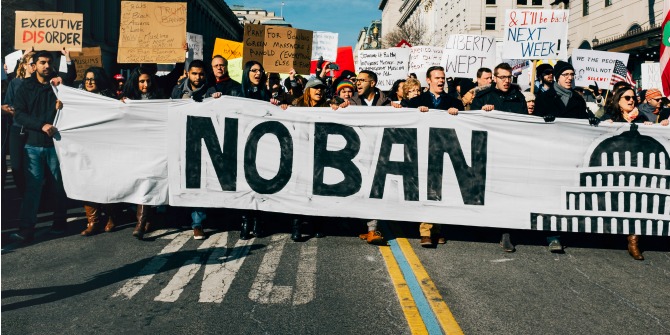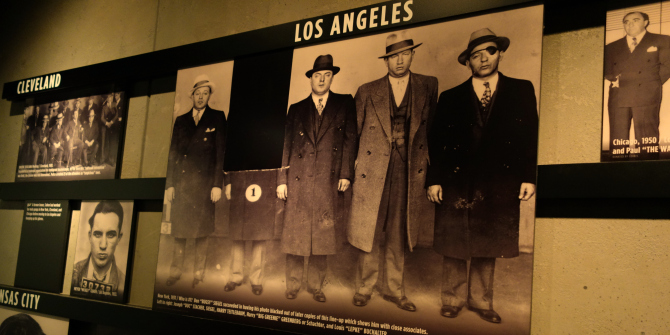 In the wake of high-profile police killings of Black men, some US cities are moving to restrict the reasons why police can stop drivers. Kelsey Shoub uses information on traffic stops to examine whether police forces are systemically racist, or if a small number of “bad apple” officers are conducting racially motivated traffic stops. She finds that while a small number of officers do search Black drivers more often, they do not account for most of the disparity in who is searched. Focusing on consent searches shows that systemic sources are at least partly to blame for racial disparities in policing.
In the wake of high-profile police killings of Black men, some US cities are moving to restrict the reasons why police can stop drivers. Kelsey Shoub uses information on traffic stops to examine whether police forces are systemically racist, or if a small number of “bad apple” officers are conducting racially motivated traffic stops. She finds that while a small number of officers do search Black drivers more often, they do not account for most of the disparity in who is searched. Focusing on consent searches shows that systemic sources are at least partly to blame for racial disparities in policing.
In the wake of the tragic killing of Tyre Nichols during a traffic stop in January, a member of the Memphis city council has proposed a new city ordinance that would reclassify six minor driving offenses as “secondary” offenses. In other words, police officers could not initiate a stop for any of those six reasons. If Memphis passes this ordinance, they will join a growing number of cities – and the state of Virginia – in limiting traffic stops for minor offenses. A target of these reforms is so-called pretextual stops, which disproportionately target drivers of color and offer officers the opportunity to carry out a micro-investigations. Proponents hope that such reforms will decrease negative police contact, increase officer safety, and, more generally, reduce racial disparities in policing.
A related reform is a ban on consent searches during a traffic stop, such as by the state of Connecticut. Consent searches are one form of discretionary search that can take place during a stop, where an officer simply asks if they can search you or your car and, if you say yes, does not need probable cause to carry out the search. Again, the hope behind this reform is that it will decrease the use of traffic stops as supplemental investigatory tool, decrease the rate of negative police contact, and decrease racial disparities in policing outcomes more generally.
What do both reforms have in common? Both target systemic sources of racial disparities in police outcomes by redefining what traffic stops can and should be used for. They shift the emphasis from a dual purpose of promoting roadway safety and a supplemental investigatory tool to a primary focus on roadway safety.
Systemic sources of racist disparities among police
However, many question whether there are systemic sources of racial disparities, instead placing all blame on a small number of “bad apple” officers.
In a recently re-issued article, I examine this debate. I don’t contest that individual officers may be racist, belong to white supremist organizations, or have engrained implicit biases that manifest in disparate outcomes. Indeed, prior investigations by organizations ranging from the FBI to national and local news organizations to research centers have documented instances of members of white supremist or nativist organizations either infiltrating or having close ties with local law enforcement. Instead, I propose that the system perpetuates racial disparities in policing through institutional rules and norms, policy, and societal culture.
If systemic sources at least partly inform racial disparities in policing outcomes, then we would expect to observe (at least) three things. First, that racial disparities in policing of White compared with Black drivers will be widespread across both officers and agencies. Second, that disparities will persist even if “bad apple” officers can be identified and excluded. Finally, that if a tool is redefined to focus then disparities may shrink. Specifically, I propose that if traffic stops are redefined as solely or mostly a traffic safety tool rather than a safety and investigatory tool then disparities should decrease.

“Shaw Neighborhood MPD Presence Washingto” (CC BY-SA 2.0) by tedeytan
Measuring racial disparities in policing using traffic stop data
How do I test these propositions? I turn to data on individual traffic stops – the most common form of involuntary police contact – made by officers in Connecticut and North Carolina. Both states require almost every state, county, and municipal agency to record basic information about the stops their officers make. As state highway patrols have different mandates than county sheriff’s and police departments, I exclude them from my analysis. Crucially for this analysis, officers are required to record information on: the driver’s race, whether the driver is searched during the stop, and whether contraband is found following that search. Additionally, the public version of the stop records includes the name of the agency that made the stop and an anonymized but unique identifier for the officer who conducted the stop.
Using this information, I calculated two measures of racial disparities: a simple metric that compares one’s search rate of Black drivers to that of White drivers and a computationally intensive metric that accounts for the relative rates at which contraband is found. Regardless of measurement approach, over half of officers and half of agencies search Black drivers at disparately higher rates than their White counterparts.
Focusing on officers who search the most, and consent searches
There are widespread disparities in who is searched following a traffic stop. What if highly disparate officers, in other words “bad apple” officers, were excluded?
If we look at the hypothetical where those highly disparate officers were never employed by their agencies and agency rates are re-calculated, disparities do go down. The agency becomes more equitable and fewer drivers are search. However, this is a substantively small decrease in both the relative search rate and disparity in search rates.
So, eliminating highly disparate officers only marginally changes who is searched and related disparities. What if instead traffic stops are limited to focus more narrowly on a traffic safety mandate rather than additionally serving as a supplemental investigatory tool?
By comparing the hypothetical world where consent searches did not occur to the when they did, I can get one look at an answer to this question. Consent searches give officers the opportunity to carry out mini-investigations without probable cause. In the hypothetical world where such searches and stops did not occur, search rates for Black and White drivers statistically and substantively decrease, while the relative disparity substantively also decreases across North Carolina departments.
Together, these three points indicate that systemic sources are at least partly to blame for racial disparities in policing.
Practically, this tells us that simply addressing police misconduct and policing disparities on a case by case, officer by officer basis will do little to change policing. It will do little do decrease racial disparities in policing. Instead, communities and departments should pursue more structural policy changes if they truly wish to see different outcomes in their communities.
- This article is based on the paper, ‘Comparing Systemic and Individual Sources of Racially Disparate Traffic Stop Outcomes’ in the Journal of Public Administration Research and Theory.
- Please read our comments policy before commenting.
- Note: This article gives the views of the author, and not the position of USAPP – American Politics and Policy, nor the London School of Economics.
- Shortened URL for this post: https://bit.ly/3yRjLk9






